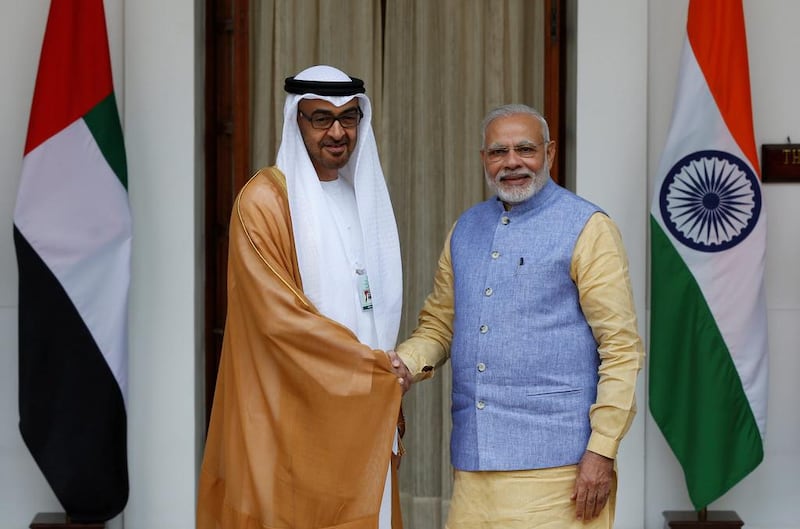NEW DELHI // The UAE and India on Thursday pledged to come up with action plans by June to achieve their shared goal of expanding bilateral trade by 60 per cent over the next five years.
In a joint statement, issued upon the conclusion of Sheikh Mohammed bin Zayed’s three-day state visit to India, prime minister Narendra Modi and the Abu Dhabi Crown Prince and Deputy Supreme Commander of the UAE Armed Forces, agreed that both countries must continue to cooperate closely to expand mutual trade and economic opportunities, leveraging the strategic bonds that exist between the two countries.
According to the statement, the action plans would “focus on identification of potential sectors and the impeding tariff and non-tariff barriers, exploring opportunities in services sector and formulating a sector-specific strategy to boost two-way trade and investments”.
The UAE side reaffirmed its interest in investing in infrastructure development in India, especially energy, power generation and transmission, defence production, industrial corridors and parks, railways, roads, ports, shipping and logistics, according to the statement.
“The two leaders reviewed the progress in realising the US$75 billion target for UAE investments in India’s plans for rapid expansion of next-generation infrastructure development. Prime minister Modi invited UAE’s participation in India’s National Infrastructure Investment Master Fund as an anchor investor. The two leaders agreed that the Joint Working Group formed under the MoU on the framework for facilitating the participation of UAE Institutional Investors in National Infrastructure Investment Fund should meet regularly to boost investment ties to realise the full potential,” the joint statement said.
India and the UAE have been among each other’s top trading partners, with a well-balanced bilateral trade of about $50bn in each of the previous two years. The UAE is one of the leading investors in India in terms of foreign direct investment. It contributes significantly to India’s energy security and was the fifth-largest supplier of crude oil to India in those years.
Commenting on the development, Prasad Nallapati, the president of the Centre for Asia-Africa Policy Research, told The National that this time around, India and the UAE did not appear to have prepared well to give a qualitative push to their bilateral relationship, despite good intentions of the leaders of the two countries.
“The $75bn UAE-India Infrastructure Investment Fund was envisioned to be the core of Comprehensive Strategic Partnership. This was agreed during Modi’s visit to the UAE in 2015 and a series of follow up meetings were held to convert it into reality. Highway development, maritime transport and even defence industry are some of the key areas identified for investments from the emirates. No such agreement was signed.”
He said: “Apparently, there was a delay in preparing an initial draft agreement on the mechanism to administer such a fund. The draft would have to undergo several stages of scrutiny before the two sides can sign it. There may be several additional questions from the UAE side on other issues unrelated to the fund’s mechanism like projected decline in the Indian economic growth rate, demonetisation, proposed economic reforms including implementation of the goods and services tax. More work is needed to convince the Emirates on the wisdom of investing in India.”
On Wednesday, the UAE and India signed a raft of MoUs and a couple of agreements that included a deal between state-owned Indian Strategic Petroleum Reserves Limited and the Abu Dhabi National Oil Company (Adnoc) on oil storage and management.
“This agreement aims to establish a framework for the storage of crude oil by Abu Dhabi National Oil Company in India and to further strengthen the strategic relationship between the two countries in the field of energy,” the Indian government said following delegation level talks between Mr Modi and Sheikh Mohammed.
Financial terms of the deal were not disclosed and it was not immediately clear when Adnoc would start storing the oil in India.
An Indian government official confirmed that Adnoc had agreed to store 6 million barrels of crude oil at an underground storage facility at Mangalore that is part of New Delhi’s strategic reserve system.
India, hedging against energy security risks as it imports most of its oil needs, is building emergency storage in underground caverns to hold 36.87 million barrels of crude, or about 10 days of its average daily oil demand in 2016.
An agreement on comprehensive strategic partnership between India and the UAE was also signed on Wednesday.
“This is a general framework agreement which highlights the areas of bilateral cooperation identified under the comprehensive strategic partnership as agreed upon in the high level joint statements issued in August 2015 and February 2016,” the Indian government said. It did not elaborate.
business@thenational.ae
Follow The National's Business section on Twitter





